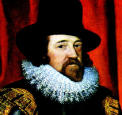









|
2. Francis Bacon (1561-1626)
Life
 Sir Francis Bacon was an English writer, philosopher and statesman
and was educated in Cambridge. When he was fourteen, Bacon finished his
education and went to Paris. In the French capital, he began to know
humanism. Sir Francis Bacon was an English writer, philosopher and statesman
and was educated in Cambridge. When he was fourteen, Bacon finished his
education and went to Paris. In the French capital, he began to know
humanism.
In 1584, Francis Bacon was elected for
the House of Commons and
started his political career. Bacon advised for the union of England and
Scotland and suggested ways to deal with Roman Catholics. For all these he
had done, he was given the title of knight in 1603. By the time of James I,
he was named as Lord Chancellor in 1618. In 1621, he was accused by
Parliament and they said that he had accepted bribes. For this reason his
political career ended.
In the following years, Francis Bacon focused on philosophy and literature.
Francis Bacon did a lot to help the advancement of science. He said that
biases had to be given up. Geographical boundaries should not stop
scientific cooperation. The countries should cooperate with each other in
science. He believed that people are the servants and interpreters of
nature. His way stressed that firstly the scientist (or in his terms the
natural philosopher) should give up biases in order to become a child before
nature. Then the scientist can collect the facts and observations for
“natural and experimental histories”.
With this knowledge, interrelationships are searched, using rules to judge
the differences between accidental and essential interrelationships. By this
method the true nature of the phenomenon is studied. Bacon’s ideas still
form the basis of many people’s idea toward science. That the scientist
should be a pure observer is a particularly popular idea. The best books of
his philosophical work are Advancement of Learning (1605) and Novum Organum
(1620). And his best literary work is Essays.
His fifty-seven essays are very stylistic, and less contracted. The essays
have the natural transitions, improved coherence, and more illustrative
material. At the same time the sentences are longer, more closely
interrelated. He was a master of different styles throughout his writing
career.
In Bacon’s essays he usually pointed out the two sides of a subject matter,
and balanced them perfectly. He let his readers to make the final decision,
and he just gave the advantages and disadvantages of the matter. Since his
purpose is not to express his own feeling, so it is not appropriate to judge
him like a Romantic critic seeking the author’s revelation through the text.
“Of Studies” best illustrates these features of his essays:
Of Studies
STUDIES serve for delight, for ornament, and for ability. Their chief use
for delight, is in privateness and retiring; for ornament, is in discourse;
and for ability, is in the judgment, and disposition of business. For expert
men can exe-cute, and perhaps judge of particulars, one by one; but the
general counsels, and the plots and marshalling of affairs, come best, from
those that are learned. To spend too much time in studies is sloth; to use
them too much for ornament, is affectation; to make judgment wholly by their
rules, is the humor of a scholar. They perfect nature, and are perfected by
experience: for natural abilities are like natural plants, that need
proyning, by study; and studies themselves, do give forth directions too
much at large, except they be bounded in by experience. Crafty men contemn
studies, simple men admire them, and wise men use them; for they teach not
their own use; but that is a wisdom without them, and above them, won by
observation. Read not to contradict and confute; nor to believe and take for
granted; nor to find talk and discourse; but to weigh and consider. Some
books are to be tasted, others to be swallowed, and some few to be chewed
and digested; that is, some books are to be read only in parts; others to be
read, but not curiously; and some few to be read wholly, and with diligence
and attention. Some books also may be read by deputy, and extracts made of
them bothers; but that would be only in the less important arguments, and
the meaner sort of books, else distilled books are like common distilled
waters, flashy things.
Bacon sees that men have bad side and good side at the same time, and he
accepts them. A reader should see Bacon in the same way. Certainly, it is a
misunderstanding if we try to look at him as a disappointed idealist,
perhaps we may misunderstand his nature and intentions. His essays, like his
whole philosophical system, are based on the realistic facts. Though he
may sometimes seem very angry at those facts, it should be remembered that
his estimate of them led him to optimism. 
|
![]()
![]()